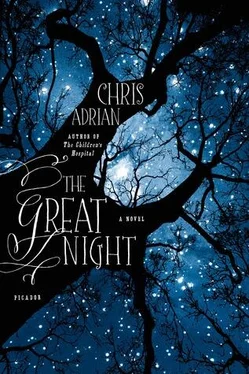“But we are all caught up in my Lady’s mistake,” said Lyon.
“Maybe she has a plan!” said Oak.
“And we are all going to die together,” said Fell.
“I wish you would stop saying that,” said Will.
“See you later,” Henry said. He sat down and closed his eyes and decided not to open them again until they had left and the great room was quiet except for the periodic ringing of the doors. Then he would open up his eyes, and he would decide what to do. He understood the girl a little better now. A person needed a little solitude to know what to do in a situation like this. He could imagine following after them, when they were gone, deciding they had not been so annoying after all and that getting out from this place was worth the probable unpleasantness involved in penetrating deeper into it. But he could imagine, too, getting up after they left to see who was knocking so insistently on the door. He didn’t know whether that was because he didn’t believe these unbelievable creatures when they told him that a death-dealing monster was waiting on the other side of the door, or because he did believe them. He suspected they were all worked up for nothing — that they were trying to trick him — and if he opened the door it would be Holly Hobby on the other side, offering up a plate of cookies. And he suspected as well that there really was a monster out there, something that would rip him to pieces or crush his head or strangle him to death.
He was thinking about what that would be like — his thoughts falling into familiar rutted tracks as he imagined a leisurely fade into suffocating oblivion — when he realized he was moving, and opened his eyes. He was being carried in the chair, moving backward toward the shadow at the end of the hall. Will and Lyon were ahead of him, Oak was hopping along behind, and Fell was nowhere to be seen until Henry peered over the side of the chair and saw he was carrying it on his back and shoulders. “We just couldn’t allow it,” Fell said. “It would have displeased our Master severely to leave you to die, even though you’re just going to die later. But that’s better than dying now! Mostly. It is! No, you don’t!” He felt Henry standing, about to jump out of the chair, and called to Oak, who jumped up in Henry’s lap, much heavier than his size suggested he would be and too heavy to budge.
“I told you not to touch me,” Henry said.
“You’re not the boss of me,” Oak said, and gave Henry a hug.
Henry followed Bobby across the breakwater. They’d come to Provincetown early in April. It was windy and cold, and it rained briefly upon them during the long way across the harbor. Henry walked carefully on the big flat rock slabs strewn in a jumble. It was not his first New England spring, but it was his first time in Provincetown, though he’d recently watched some porn set here, in which the protagonist made this same journey over the breakwater and then got a blow job and a fucking in the shadow of the Woods End lighthouse. Henry watched Bobby placing his feet on the upward- and downward-slanting faces of the stone slabs, thinking of how he had trod infelicitously, back in Cambridge, on a place in Henry’s driveway, marked with an oil stain in the shape of a bird, where a letter from Henry’s mother had fallen to the ground. Cambridge was far away, separated from them by a huge expanse of cleansing water, and yet Bobby still had a taint upon his shoe. Henry deliberately failed to avoid stepping where Bobby stepped, which seemed like progress. He had measured progress against his obsessions and compulsions in much smaller increments back then.
“Look at that!” Bobby said, pointing out a half-sunken rowboat in the tidal flats, where a little crab was standing with its claws thrust upward. “I did it!” Bobby said, throwing his hands and arms up spastically, aping the crab’s gesture. Henry had a patient, a little girl with Down syndrome, who said those words and made that gesture at every opportunity, celebrating every triumph and mistake of her day, whether it was winning a bingo game or wetting her bed. Doctors in general and pediatricians in particular were not supposed to make fun of retarded children, but making fun of them, and deformed children and dying children and especially dead babies, was actually a staple of the training. Henry had trouble trusting pediatricians who couldn’t laugh at a nice dead-baby joke; it suggested to him somehow that they weren’t sufficiently traumatized by their common experience. He laughed, and threw up his hands too, in ridicule of that little girl but also in solidarity with her, because all his own triumphs seemed comparably admirable and pathetic.
He caught up to Bobby and lost his balance jumping over a gap in the slabs. Bobby caught his hand and kept hold of it. Provincetown was still largely abandoned. Three-quarters of it was closed down, and there was hardly a homosexual in sight, except for their ancient innkeeper and his rubber-panted gimp, but even in its most remote reaches the town felt like a place where it was okay for two men to hold hands. Bobby had worried a lot in his youth about God striking him down for being gay, and Henry had had a corresponding worry — not restricted to his youth, and never really abandoned — that nature, abhorring him, would do the same thing. Provincetown countered with a more pleasant delusion: all the gayness that had loitered there had rubbed off on the rocks and water and sand, so nature smiled on you when you held hands with your boyfriend on the breakwater, or made out with him on the moors, or even if you made a pornographic video on the beach. “I like it here,” he said to Bobby.
“Me too,” Bobby said.
“I mean, really,” Henry said, meaning that he liked being there with Bobby.
“Me too. Really. A lot.” Bobby didn’t smile, but he was wearing his happy face, which was a different sort of troubled look from the one he habitually wore. That was so much easier to accept, and to believe, Henry found, than a big Donny Osmond smile would have been. Who could trust Donny Osmond, with his perfect teeth and his perpetually sunny outlook, fermented in a wish-fulfilling Mormon cosmogony that knew absolutely nothing of the terrible real world? Bobby had just come back from a difficult rotation in Lesotho, and that made his relative absence of frown more reassuring and uplifting than any ignorant smile would have been.
He had been gone for a month, which gave Henry a long time to miss him and to admit how much he liked him. He had been storing up affection for Bobby somewhat in secret, not just from Bobby but from himself. He was in the habit of ignoring alarming developments for as long as he could, and so he ignored the fact that he was falling in love with Bobby until he started to pine for him. Bobby took up residence in Henry’s imagination, and Henry followed him through his African day, making up details to supplement the ones Bobby supplied over the phone: identical cowboy-print short-sleeved shirts for the twin orphan boys unofficially adopted by the expatriate staff at the hospital where Bobby was working, who were a mix of smarty-pants do-gooders and ne’er-do-wells hiding out from the stateside consequences of their laziness and incompetence; a collar made of paper clips for the skinny dog that followed Bobby every morning on the short walk from his dormitory to the hospital; bright red nails on the woman brought to the emergency room in seizures, poisoned by her husband. The absence of the real-world Bobby made it possible for him to date an imaginary Bobby and to fall in love with him; much later, post-breakup and post-breakdown, he would wonder if he would ever have fallen in love with the real-world Bobby without falling in love with the imaginary version first. It was something he would figure out only after Bobby dumped him: that his imagination was what made the real world, and real people, only barely palatable for him.
Читать дальше












